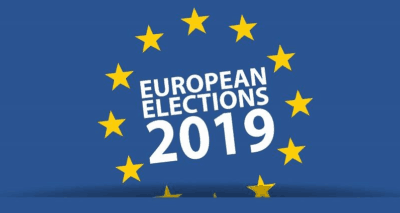
During the last few years, the landscape of politics in Europe has undergone a major transformation. A wave of skepticism about the current state and the future of the EU has been felt across EU Member States, culminating in Britain’s vote to leave the Union. With the European elections coming up, how will Euroskepticism, Brexit and global issues like climate change influence the outcome and the structure of the new European Parliament and the Commission?
European People’s Party Emerges as Top Contender
Ever since the Treaty of Rome, which formed the European Union, was signed in 1957, the European project has kept steadily growing. For some avid proponents of the EU idea, it has moved too slowly, as it still has a long way to go from becoming a real confederation of states – much like the United States of America. For others, it has moved too quickly for nation states and the people living to keep up with the rapid developments. One thing is for certain: the EU has emerged as an important player in international politics, and it has drastically influenced the policies of the 28 states that form it today. By conceptualizing and implementing a single internal market, where goods, capital and people can move freely and without being subject to tariffs or limitations, it has radically changed what Europe looks like. This policy reached its highest point with the introduction of the Euro as a single and shared currency among almost all Member States, while the EU has also expanded its reach to other issues – including consumer law, environmental policy, and education. This is why the results of the EU elections will have an impact not only on EU Member States, but on the global state of affairs.
How are they set to play out? According to European politics odds calculated by Oddschecker as of 17 May 2019, the European People’s Party (EPP) is the strongest contender to win the most seats at the European Parliament at odds of 1/25, while the Progressive Alliance of Socialists and Democrats (S&D) are second at 11/1. The Alliance of Liberals and Democrats for Europe (ALDE) is set at 35/1, and the Europe of Nations and Freedom (ENF) is ranking lower at 41/1. When it comes to the next President of the EU Commission, according to the same source, Manfred Weber is the strongest candidate at odds of 11/10, with the remaining candidates ranking slightly closer to each other, as Michel Barnier is set at 8/1, Frans Timmermans at 9/1 and Margrethe Vestager at 10/1. The European Parliament odds are hardly a surprise, as the EPP and the S&D are traditionally the European Parliament groups with the most members, appealing to the conservative and social democrat MPs and political parties across Europe – which are usually the most popular voting choices. The EPP seems to have consolidated its place as a reliable choice that is supportive of the EU project, since Germany’s ruling party, the CDU, played a pivotal role in the negotiations of how the EU would deal with the crisis it underwent in the last few years.
How Have Euroscepticism, Brexit, and Climate Change Influenced Voter Decisions?
It should also come as no surprise then that thatManfred Weber, who is currently the leader of the EPP, has emerged as the forerunner in the race for the position of the President of the European Commission, which is the driving force behind EU integration. Coming from a conservative political background, Weber is running on a platform of closer EU integration, support for businesses across Member States, and an emphasis on security in light of the recent global challenges. In the past, he was also criticized for failing to keep Hungary’s ruling party, which was a member of the EPP, in check, as well as for occasionally not making a clear stand on human rights issues, but he has also campaigned for initiatives that will reinvigorate the interest of young people for the EU – for example, by petitioning for free train tickets for all EU citizens once they turn 18 so that they can travel around and discover Europe. It seems voter support for the EPP and its leader is also in part a response to the recent crisis, as EU proponents are turning to what they perceive as strong leadership in turbulent times.

This turbulence culminated with the UK referendum vote that saw the majority of British citizens vote to leave the EU. While the United Kingdom has always approached its relationship with the EU with caution, keeping its own currency and opting out of several common policies, the vote came as a blow for many EU proponents. For other analysts, it was a highly probable outcome as Euroscepticism across the political spectrum, endorsed by both right-wing and left-wing politicians, seemed to have reached a tipping point. Yet while many predicted that Brexit would be the start of the end for the EU, things seem to have moved towards the opposite direction. EU Member States have largely united in their efforts to successfully negotiate this wholly new situation with Britain and have also built on the common ground they found when dealing with the Greek crisis a couple of years before. Even though Brexit has not yet been implemented, at first glance it seems that it functioned as a wake-up call across Europe and made voters more aware of the impact that the demise or prosperity of the EU is set to have on their lives.
But Euroscepticism is far from over, and it seems to be playing a pivotal role in these elections. In this context, it is important to note the relative rise of the ENF, which is notable for accommodating parties that are mostly negative to the notion of further EU integration. While the ENF is the smallest party in the current European Parliament, holding 37 out of 751 seats, it is placing fourth in odds to win. Founded in 2015 and spearheaded by French politician Marine Le Pen, who is renowned for her largely nationalist political views and criticism of the EU, the ENF seems to have emerged as a convergence point for many Eurosceptics and has managed to surpass the Greens and the Nordic Green Left who advocate for more progressive and environmentally-friendly policies. For the Greens/European Free Alliance party, a stronger EU will have to act to tackle climate change and promote biodiversity – but in the midst of the political turmoil focusing on whether the EU idea should be reformed, reinforced, or abandoned, green policies seem to rank lower in voters’ motivation, despite the urgency of the situation across the globe.
These EU elections are expected to set the tone with regard to how EU citizens perceive the future of the EU – and this seems to be the central issue that will influence voter turnout as well as the choices they make when casting their vote.


